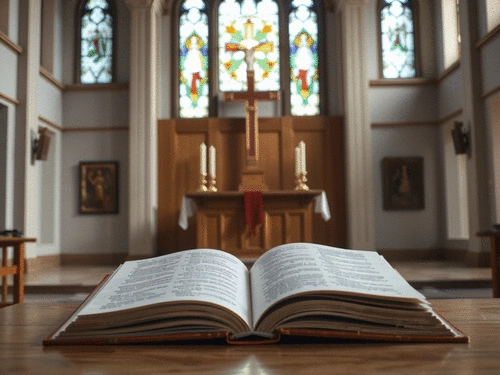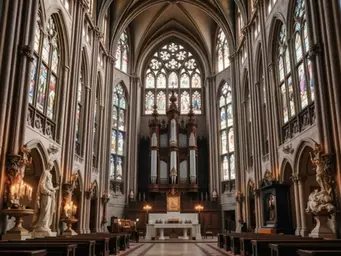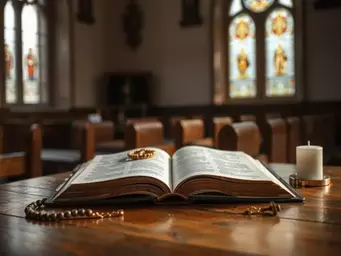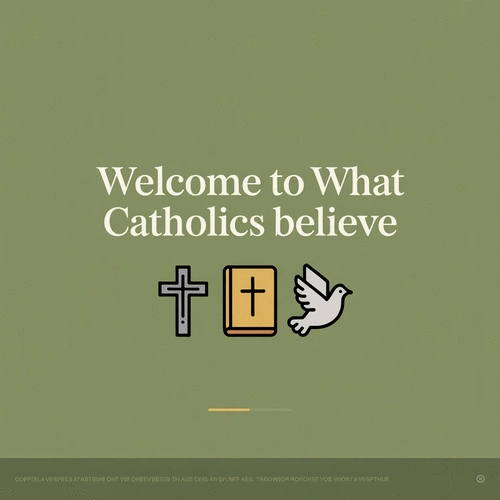In today's fast-paced society, many Catholics grapple with balancing their faith and contemporary challenges. How can we ensure that our beliefs remain relevant and engaging? Exploring the evolution of Catholicism reveals a dynamic faith that addresses modern issues while remaining anchored in tradition.
What You Will Learn
- The impact of Vatican II on modern Catholic practices and community engagement.
- How contemporary issues like LGBTQ+ rights and environmental stewardship are shaping Catholic teachings.
- The importance of personal faith journeys and how education plays a crucial role in understanding Catholic doctrine.
- Ways technology is transforming the experience of faith through online communities and digital resources.
- The significance of interfaith dialogue in promoting shared values and social justice initiatives.
Key Shifts in Modern Catholicism
This visual highlights three significant areas of evolution and focus within modern Catholic beliefs, illustrating how the Church integrates contemporary issues with traditional teachings while fostering personal faith journeys.
Evolution of Doctrine & Vatican II
- Increased lay participation
- Collegial governance approach
- Dialogue with other religions
- Vernacular language in liturgy
Engagement with Social Issues
- Discussions on LGBTQ+ inclusivity
- Environmental stewardship (Laudato Si’)
- Advocacy for immigrants
- Emphasis on social justice
Personal Growth & Technology
- Role of prayer and sacraments
- Impact of social media & online communities
- Digital resources for spiritual growth
- Interfaith dialogue for understanding
Summary: Integrating Faith & Modernity
Modern Catholicism dynamically integrates contemporary issues (LGBTQ+ rights, social justice, environment) with traditional beliefs, fostering personal faith journeys through community, education, and digital engagement, while emphasizing interfaith dialogue.
Holistic ApproachUnderstanding Modern Catholic Beliefs in Today's Society
As we navigate the complexities of our modern world, understanding how Catholic beliefs resonate within contemporary society becomes increasingly important. It's fascinating to see how the Church has evolved, adapting its teachings to remain relevant while staying true to its core principles. In this exploration, we’ll delve into the historical shifts and current perspectives that shape the Catholic faith today!
Within this discussion, we will examine the evolution of Catholic doctrine, the Church's engagement with pressing social issues, and how personal faith can thrive amidst modern challenges. Let’s get started!
The Evolution of Catholic Doctrine: A Historical Perspective
The landscape of Catholic doctrine has undergone significant transformation over centuries, particularly in the wake of the Second Vatican Council (Vatican II). This monumental event in the 1960s marked a pivotal shift towards embracing modernity while addressing contemporary issues. Vatican II aimed to make the Church’s teachings more accessible and relevant to the lives of believers.
- Increased lay participation in Church activities
- A more collegial approach to Church governance
- Dialogue with other religions and non-Christian faiths
The reforms initiated by Vatican II have profoundly influenced how we practice our faith today, promoting inclusivity and encouraging a more active role for the laity in parish life.
How Vatican II Reforms Shaped Contemporary Catholicism
One of the most significant outcomes of Vatican II was the emphasis on community and engagement within the Church. Catholics began to see their faith as a lived experience rather than a series of rituals. This evolution helps us connect our spiritual lives with the real-world challenges we face every day.
The push for vernacular language in the liturgy made Mass more accessible, allowing worshippers to engage with the faith in their everyday language. This shift has made a noticeable impact on how we experience and understand the sacraments.
Key Changes in Catholic Church Teachings Over the Decades
Since the reforms of Vatican II, the Church has continued to adapt its teachings in response to changing societal norms. Notable changes include:
- The acceptance of diverse family structures
- Encouragement of environmental stewardship
- Greater inclusivity regarding LGBTQ+ issues
These adaptations illustrate the Church’s commitment to engaging with the world while still upholding the essence of its teachings. It’s essential for us to recognize these shifts as we navigate our own faith journeys.
The Role of Papal Authority in Modern Catholic Doctrine
Papal authority remains a cornerstone of Catholic doctrine, providing guidance and direction for the faithful. Popes, like Pope Francis, have emphasized a pastoral approach, focusing on mercy and compassion rather than strict adherence to rules. This shift encourages Catholics to engage with others in meaningful ways, reflecting Christ’s love in our interactions.
Through encyclicals and public statements, the papacy addresses contemporary issues, urging the Church to respond to the pressing needs of the world. This dynamic allows us to actively participate in discussions about faith, ethics, and social justice.
Current Perspectives on Catholicism and Social Issues
Today’s Catholic Church is not an isolated entity; it actively engages with various social issues that impact our world. From climate change to immigration, these topics are critical to our collective moral obligations as Catholics. Understanding how the Church navigates these challenges is vital for living out our faith in actionable ways.
As we discuss current perspectives, we should consider how Catholic teachings inform our responses to social issues and how they can inspire us to make a difference in our communities!
Engagement with Contemporary Topics: LGBTQ+ Rights and Synodality
One of the most pressing issues facing the Church today involves LGBTQ+ rights. While the Church has traditionally held conservative views, there’s an ongoing conversation about inclusivity and acceptance. The recent synodal process encourages dialogue among Church members to discern how best to approach such contemporary topics.
- Promoting pastoral care for LGBTQ+ individuals
- Understanding the distinction between Church teachings and cultural perceptions
- Creating spaces for dialogue within parishes
This evolving conversation demonstrates the Church's willingness to listen and respond to the lived experiences of its members, fostering a spirit of unity and understanding.
The Catholic Church's Stance on Climate Change and Immigration
The Catholic Church has been vocal about addressing climate change, viewing it as a moral issue that affects the most vulnerable. Pope Francis' encyclical, Laudato Si’, calls for urgent action to protect our common home. This reflects our responsibility as stewards of creation, a principle deeply rooted in Catholic beliefs.
Additionally, the Church advocates for humane treatment of immigrants, emphasizing the dignity of every person. Engaging in these issues allows us to live out our faith actively, echoing the call to serve those in need.
Understanding Catholic Social Teaching in Addressing Social Justice Issues
Catholic Social Teaching provides a framework for addressing social justice issues through the lens of our faith. Its principles emphasize the inherent dignity of the human person and the necessity of promoting the common good. Here are key principles that guide our actions:
- The dignity of the human person
- The importance of community and participation
- Solidarity with the marginalized
By integrating these teachings into our lives, we can contribute to a more just and equitable society, reflecting the core values of our faith!
Faith and Personal Growth in Modern Times
As we navigate modern challenges, cultivating our faith becomes essential for personal growth. Many individuals struggle to balance daily life with spiritual commitments, yet these challenges can also lead to profound growth. Personal narratives often reveal how believers find strength and inspiration through their faith.
In sharing our experiences, we can inspire each other to deepen our understanding and practice of Catholicism, even amidst distractions and obstacles!
Personal Narratives: How Individuals Navigate Their Faith Today
Many Catholics today share stories of how they navigate their faith within the context of their everyday lives. These narratives often highlight the importance of community, support networks, and personal reflection. For example, some may find solace in small groups that facilitate discussions on faith and everyday challenges.
- Building relationships through shared experiences
- Finding mentors or spiritual directors for guidance
- Engaging in volunteer opportunities that align with personal values
These connections can transform our faith journey, making it a collective experience that strengthens our belief and commitment to living out our values.
Spiritual Growth Amidst Modern Challenges and Changes
Modern life brings unique challenges that can impact our spiritual growth. Balancing work, family, and personal commitments often requires intentionality and reflection. However, these challenges can lead to a deeper reliance on faith.
Recognizing the need for prayer and reflection during difficult times helps us cultivate resilience and deepen our relationship with God. This connection is essential as we strive to navigate life's complexities!
The Importance of Prayer and Sacraments in Daily Life
Prayer and the sacraments serve as vital components of our spiritual lives. They anchor us and provide the grace needed to face each day. Regular participation in the sacraments, such as the Eucharist and Reconciliation, allows us to renew our commitment to God and receive strength for our journeys.
- Daily prayer as a source of comfort
- Regular confession for spiritual renewal
- Community worship to foster connection and support
Emphasizing the importance of these practices encourages us to remain rooted in our faith, no matter the circumstances we encounter.
Technology's Influence on Modern Catholic Beliefs
In our digital age, technology has transformed the way we engage with our faith. Social media, online communities, and digital resources have created new avenues for connection and learning. As we embrace technology, we must also consider how it influences our beliefs and practices.
Utilizing these modern tools can enrich our faith experience and keep us engaged with our spiritual communities. Let’s explore some of these influences!
The Role of Social Media and Online Communities in Faith Practices
Social media platforms have become powerful tools for sharing faith and connecting with others. They offer spaces for discussion, inspiration, and community-building. Many Catholics share their journeys online, creating a vibrant tapestry of experiences that unite us as a global Church.
- Formation of online prayer groups
- Sharing of personal faith stories and reflections
- Access to inspirational content from Catholic leaders
These interactions enable us to nurture our faith while engaging with a broader audience, reminding us that we are not alone in our spiritual journeys! Recent studies, such as the 2023 CARA Media Use Report, highlight the growing trend of Catholics utilizing digital platforms for spiritual growth and community engagement.
Digital Resources for Spiritual Growth and Community Engagement
There is a wealth of digital resources available to aid in spiritual growth. Articles, podcasts, and videos can provide insight into Church teachings and contemporary issues. For example, platforms like What Catholics Believe offer articles and FAQs that help clarify complex doctrines and connect faith to everyday life.
These resources can empower us to explore our faith further and engage with our communities in meaningful ways, reinforcing our understanding of Catholic teachings!
The Impact of Liturgy and Online Worship on Modern Faith Expressions
Online worship services have gained popularity, especially in recent years. They allow individuals to participate in the liturgy from home, fostering inclusivity and accessibility. While online worship cannot fully replicate in-person experiences, it has provided a valuable alternative, connecting believers across distances.
- Access to a variety of liturgical styles
- Opportunities for remote participation in sacraments
- Creating a sense of community despite physical barriers
As we continue to embrace technology, we find innovative ways to express our faith and engage with our communities, reflecting the vibrant spirit of Catholicism in modern times.
Interfaith Dialogue and Ecumenism: Building Bridges
Interfaith dialogue and ecumenism play crucial roles in fostering understanding and respect among different faith traditions. By exploring our shared values, we can build bridges that promote peace and cooperation in addressing global challenges.
In a world that often feels divided, the Church's commitment to dialogue exemplifies a path forward, allowing us to learn from one another while embracing the richness of our diverse beliefs!
Understanding Catholic Social Teachings in an Interfaith Context
Catholic Social Teaching emphasizes principles that resonate across faiths, such as human dignity, solidarity, and the common good. Exploring these teachings in an interfaith context can help us discover common ground with other religious traditions.
- Building relationships based on mutual respect
- Collaborating on social justice initiatives
- Encouraging dialogue to address global challenges
These efforts remind us of our shared humanity and the potential for collective action in promoting peace and justice!
Collaborations Between Different Faiths: Shared Values and Respect
Collaborative efforts between different faith traditions can yield powerful results. Working together on social issues such as poverty, education, and environmental stewardship allows us to amplify our voices and make a meaningful impact.
By recognizing and celebrating our shared values, we can build stronger communities and foster understanding among diverse populations. This is an inspiring aspect of modern Catholicism!
Exploring Interfaith Dialogue: Bridging Beliefs and Cultures
Interfaith dialogue serves as a platform for exploring beliefs and cultural practices, promoting greater understanding and respect. Engaging in these conversations can enrich our faith lives and challenge us to grow in empathy and compassion.
- Participating in community interfaith events
- Learning about other traditions through personal connections
- Encouraging openness and curiosity in discussions
As we embrace interfaith dialogue, we contribute to a more harmonious world, embodying the love and respect that are central to our Catholic faith!
Interactive Poll: Share Your Thoughts!
As we reflect on the evolving nature of the Catholic Church, we want to hear from you! What contemporary issue do you feel the Church should prioritize in its teachings and outreach?
Frequently Asked Questions About Modern Catholic Beliefs
What is the significance of Vatican II in modern Catholicism?
The Second Vatican Council (Vatican II), held in the 1960s, was a pivotal event that initiated significant reforms in the Catholic Church. It aimed to modernize the Church's teachings, increase lay participation, adopt vernacular languages in liturgy, and foster dialogue with other religions, profoundly shaping contemporary Catholic practices and community engagement.
How does the Catholic Church address contemporary social issues like LGBTQ+ rights and environmental stewardship?
The Catholic Church is actively engaging with contemporary social issues. While traditionally holding conservative views on LGBTQ+ rights, there is an ongoing conversation within the Church about inclusivity and pastoral care. On environmental stewardship, Pope Francis' encyclical Laudato Si’ calls for urgent action to protect the environment, viewing it as a moral imperative. The Church also advocates for humane treatment of immigrants and emphasizes social justice principles rooted in Catholic Social Teaching.
How has technology influenced the practice of faith in modern Catholicism?
Technology has significantly transformed faith practices. Social media and online communities provide new avenues for connection, discussion, and spiritual growth. Digital resources like articles, podcasts, and videos offer insights into Church teachings. Online worship services have also gained popularity, allowing remote participation and fostering a sense of community despite physical barriers, as seen in the increasing use of digital platforms by Catholics.
What is the role of interfaith dialogue in modern Catholicism?
Interfaith dialogue and ecumenism are crucial for fostering understanding and respect among different faith traditions. By exploring shared values like human dignity and the common good, the Church builds bridges that promote peace and cooperation. Collaborative efforts on social issues and open conversations about beliefs and cultures enrich faith lives and contribute to a more harmonious world.
How do individuals cultivate personal faith journeys amidst modern challenges?
Individuals cultivate personal faith journeys through various means, including community support, prayer, and active participation in sacraments. Personal narratives highlight the importance of relationships, mentors, and volunteer opportunities. Despite modern challenges, intentional prayer and reflection are critical for spiritual growth, fostering resilience and a deeper relationship with God.
Summarizing the Key Aspects of Modern Catholic Beliefs
As we delve into the essence of modern Catholic beliefs, it becomes clear that these principles are not just relics of the past but vibrant guidelines for living today. It's fascinating to witness how the Church integrates contemporary issues with traditional beliefs, shaping a faith that resonates with both the young and the old. This ongoing dialogue ensures that our faith is not stagnant but evolves to meet the challenges of the modern world.
One key area of focus is how the Church embraces current societal concerns while remaining rooted in its teachings. By addressing issues like social justice, environmental stewardship, and the dignity of every individual, the Church shows its commitment to being relevant in today’s society. This balance of tradition and innovation is essential for nurturing a faith that can actively engage with the world. A significant portion of U.S. adults, about 47% according to Pew Research, have a personal or family connection to Catholicism, reflecting its broad societal impact.
Integrating Contemporary Issues with Traditional Beliefs
It's essential to recognize that modern Catholicism doesn’t shy away from difficult conversations. Instead, it seeks to integrate contemporary issues into the rich tapestry of its beliefs. Here are some significant ways this integration occurs:
- LGBTQ+ Rights: The Church is increasingly open to discussions about LGBTQ+ rights while maintaining its teachings on family and love.
- Social Justice: Addressing poverty, racism, and inequality is at the forefront of Catholic teaching, emphasizing the inherent dignity of every person.
- Environmental Stewardship: The Church advocates for care of creation, aligning with global movements for sustainable practices.
- Immigration: The call for compassion and hospitality towards migrants is a crucial aspect of Catholic social teaching.
By engaging with these topics, we can see how modern beliefs are not in opposition to tradition but rather a continuation of the Church’s mission to spread love, mercy, and justice in the world.
Encouraging Personal Faith Journeys in a Modern Context
Each person's journey of faith is unique, shaped by personal experiences, challenges, and the desire for connection. At What Catholics Believe, we understand that fostering these individual journeys is vital in today’s fast-paced society. We encourage readers to explore their faith, whether through personal reflection, community involvement, or ongoing education.
One way to enhance personal faith journeys is through education. We can see the impact of Catholic education in shaping beliefs and fostering a deeper understanding of the faith. This includes:
- Catechetical programs: Providing foundational knowledge of Catholic doctrine and traditions.
- Adult faith formation: Offering opportunities for grown-ups to deepen their understanding and practice of faith.
- Engaging curricula for youth: Creating a space for young people to explore their beliefs and ask questions.
By investing in education and personal growth, we can navigate the complexities of modern life while remaining rooted in our Catholic identity.
Engagement and Resources for Continued Exploration
At What Catholics Believe, we strive to provide resources that support your spiritual journey. Whether you're a lifelong Catholic or just beginning to explore the faith, there are numerous avenues for engagement and growth available to you. Let’s discover some valuable resources!
Multimedia Resources: Videos, Podcasts, and Infographics
In our digital age, accessing faith-based content has never been easier. We offer a variety of multimedia resources that cater to different learning styles:
- Videos: Engaging visual content that explains complex doctrines and traditions in an accessible way.
- Podcasts: Conversations with experts that delve into contemporary issues and their connection to Catholic teachings.
- Infographics: Easy-to-understand graphics that summarize key beliefs and traditions visually.
These resources are designed to enhance your understanding of the Catholic faith and connect you to a larger community of believers.
Joining Online Communities for Support and Discussion
Another fantastic way to deepen your faith is by joining online communities. These platforms provide opportunities for discussion, support, and shared experiences. By connecting with others, you can:
- Share insights: Engage with fellow Catholics on various topics and learn from their experiences.
- Participate in discussions: Contribute your thoughts and ask questions in a supportive environment.
- Find accountability: Connect with others who can help you stay committed to your faith journey.
Connecting with Catholic Charities for Community Involvement
Finally, engaging with local Catholic charities is a beautiful way to live out your faith in action. Volunteering and supporting charitable initiatives can have a profound impact on both the community and your personal growth. At What Catholics Believe, we often highlight opportunities to get involved, reminding us that faith must also be expressed through service and love for our neighbors.
By exploring these resources and engaging with the community, we can deepen our understanding of the Catholic faith while navigating the modern world together. Let's continue this journey with an open heart and mind!
Recap of Key Points
Here is a quick recap of the important points discussed in the article:
- The Catholic Church has evolved significantly, especially since the Second Vatican Council, promoting inclusivity and lay participation.
- Contemporary Catholicism integrates modern issues such as LGBTQ+ rights, social justice, and environmental stewardship into its teachings.
- Papal authority, particularly under Pope Francis, emphasizes mercy and engagement with pressing social issues.
- Personal faith journeys are enriched through community support, prayer, and active participation in sacraments.
- Technology plays a crucial role in modern faith expressions, enabling connections through online communities and resources.









